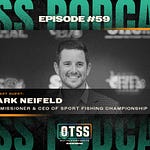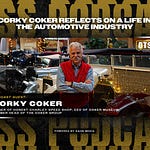On the latest episode of “Only The Strong Survive,” host Dan Kahn sits down with HitchFire Founder and CEO Evan Currid. The innovative and upcoming brand simplifies outdoor cooking by mounting custom-designed grilles to vehicle hitch receivers. HitchFire isn’t Currid’s only venture, as he was also the founder of Tepui Outdoors. A brand well-known in the overland community, Tepui was one of the first to introduce rooftop tents to the American market.
Currid’s entrepreneurial experience actually started earlier than that of both brands. In his teen years, he opened a bar and restaurant using a space owned by his father. After the success of the quaint eatery in his small hometown in rural Pennsylvania, Currid went on to develop a local music festival in a farmer’s field. He then used those earnings to fund his adventures and travel before heading to college.
Evan Currid’s entrepreneurial journey is fascinating, and he has deep knowledge of the culture of startups and launching businesses. Here are our top five takeaways from Dan and Evan’s discussion.
Why Being a Fast First Mover Matters
It may be hard to believe, but there was a time when rooftop tents were completely unheard of in the United States. On a road trip with his wife in Venezuela, Evan first noticed the shelters strapped to vehicle roofs. On a remote beach, almost every vehicle had one complete with lighting and even air conditioning.
After his wife was laid off in the middle of a recession, the couple came up with the idea of importing the tents to America. Unsure if there would even be demand for the unique product, it was a big risk. However, being the first to introduce rooftop tents to the country allowed Tepui to dominate the market for a long time and build its brand before others could jump on the bandwagon.
How Perseverance Pays Off
Launching a rooftop tent company might seem like a surefire bet now, but as one of the first in the space, there was a lot for Evan and his wife to figure out. Initially, the duo thought they could just import tents from a supplier in Venezuela. However, black market currency exchanges, the whims of a dictatorial government, lackluster build quality and other sketchiness quickly showed that was a bad idea. Evan then tried to build the tents locally in Santa Cruz, California, but the costs were too high. Finally, he secured a manufacturing partner that could make quality tents cost-effectively.
Tepui is a colossal brand now, but it didn’t start that way. Building it was a slow burn, labor-intensive and somewhat scary. Evan used all of his life savings to launch it. There were a lot of problems that had to be figured out along the way, countless sleepless nights and panicky moments. But Evan figured it out, pushed forward and kept going. Perseverance and adaptability are huge parts of entrepreneurship.
Building Customer Connections and Brand Authenticity is Key
As a startup, Tepui didn’t have the funds for giant industry shows and investing heavily in multiple forms of advertising. Evan was also dealing with an entirely new type of product that was unfamiliar to most consumers. Admittedly, he also wasn’t a die-hard overlander with decades of experience camping in the bush but more of an adventurer, surfer and mountain biker. These factors created an uphill struggle when launching Tepui and its new-to-market rooftop tents.
To solve these problems, Evan went on a guerilla marketing campaign and to where his customers were. He hooked up with local 4x4 clubs, went to smaller events like Overland Expo and even parked at surf spots and alongside the road with an open tent. The unique marketing push let him answer questions, educate consumers in person and gather direct feedback. It also helped build brand authenticity by showing Tepui was part of the community instead of some faceless corporate entity. Evan would use the same successful model to later launch HitchFire.
The Importance of Distribution
Designing new products, building a brand and going to market are the “sexy” parts of entrepreneurship. Everyone loves going on photoshoots, creating videos and the excitement of product unveilings. However, there is a lot more to creating a successful brand than the more glamorous aspects. The “nuts and bolts” of running a brand might not be flashy, but they can quickly sink your startup.
One of the least sexy aspects of a startup is figuring out distribution. However, Evan recalls how becoming involved with REI as a distributor was one of the biggest boons for Tepui. It opened up substantial distribution channels to a largely new group of customers and brought REI’s massive marketing power to the fold. The move helped put Tepui “on the map” as a dominant brand and significantly increased sales.
Why Passion is the Secret Weapon
Launching and running a business involves a lot of hard work. The grind mentality can be a very real part of it. However, being forever stuck in it is a quick path to burning yourself and your employees out. “Whatever hurdle you may come up to next, you push on, you grind on. That doesn't mean it's a 70-hour work week,” shares Evan. “I didn't start the first company and sell it so that I could work 70 hours on the second one, and none of our employees do either. I also didn't come this far to just waste my life away in an office looking at spreadsheets and emails.”
Talking with Evan, it is easy to see his passion for launching companies, building brands and making great products. He is doing what he loves and is interested in, and the results show that. Being passionate about what you are doing and balancing that with life and pursuits outside of work is critical to being successful.












